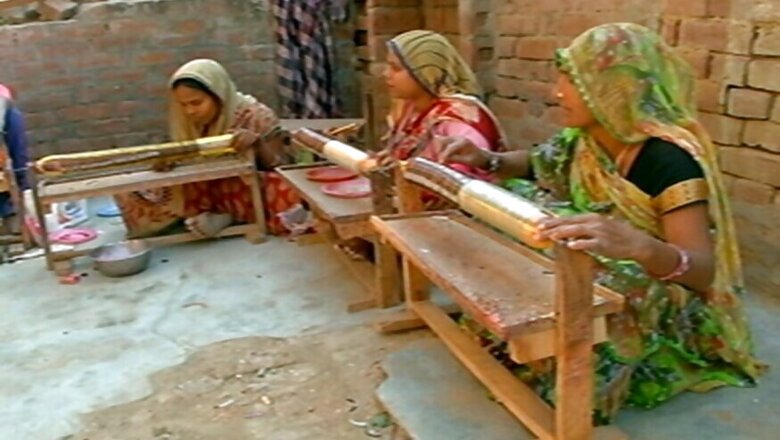
views
Meerut: Three months after Prime Minister Narendra Modi surprised the nation with his demonetisation drive, the small and medium enterprises in poll-bound western UP are picking up the pieces and crawling back to normalcy.
The town of Khurja in Bulandshahr district is famous for its pottery-making and ceramics businesses. Mohammed Faheemuddin, who owns a pottery-making factory, says he was forced to shut his factory for two months. “I own two businesses, pottery-making and meat exporting. If I combine both my businesses, the number of people I employ is around 800 people. When the cash flow became tight, it affected everything. I could not pay my workers, I could not pay my vendors and since the sale was negligible, there was no cash coming into my businesses. For two months, my factories stayed shut for two months. All my workers were forced to go back to their villages. When I got enough working capital to start my factories again, I had to call of them individually. Some came back from Bihar, some from Bengal and some from Eastern UP. Almost all of them came back but some still chose to stay in their villages. Finally, things are getting back on track,” he says.
The sports goods industry, considered the financial backbone of Meerut city, too, suffered heavy losses. According to Sunil Sharma, who owns the Meerut-based Kapil Sports, production fell by around 30-40% in the months following demonetisation.
“I am lucky because my workers decided to cooperate with me during demonetisation. I paid their wages slowly and they understood. It is because of their commitment that I was supposed to stay afloat. Many people were not so lucky and were forced to shut shop. Since I could not pay my vendors, procuring raw materials had become a real problem. That meant I could not produce in the same scale. Sports goods, for many families, are a luxury item. Many families put their plans of buying sports goods on hold. They preferred to spend on essential items first. That really hurt our business. Now the situation is improving but slowly,” he says.
While Sharma and Faheemuddin claim that demonetisation will have little bearing on the upcoming UP assembly polls, farmers were less forgiving. Vinod Jatoli, Meerut district president of the Bhartiya Kisan Union (BKU), had this to say: “Western UP lies in the fertile tract of land between the Yamuna and Ganga known as the Doab. As a result, agriculture is the main trade in the region. The worst affected due to demonetisation were farmers. The government showed some figures and said the sowing had not been affected in the early months since farmers were able to buy seeds. However, what the government did not show was the drop in the sale of fertilizers. Even now, banks in rural areas are not dispensing cash regularly. ATMs are almost always out of cash. The government can’t pretend like everything is ok.”
One of the District Magistrates in western UP confirmed Jatoli’s arguments. The DM, on condition of anonymity, told News 18: “In November, many people overlooked an important figure. The sale of fertilizers had dropped to one-sixth of what it was the year before. The most commonly used fertilizer by wheat farmers is di-ammonium phosphate (DAP), which has to be used at the time of sowing. DAP is mixed with the soil before the seeds are planted in the ground. Many farmers were desperate to start the sowing process so they decided to go ahead without using fertiliser. This will also impact the yield from the crop this year. This was only in the first few months. While I hope things improved, I have not yet been able to compile the final figures. This will certainly affect the yield.”
According to Jatoli, the BJP will have to “suffer the consequences” of demonetisation on February 11, when western UP heads to polls. “It is clear that they didn’t think of farmers when they were implementing this decision. Farmers feel they have been taken for granted. No wonder BJP is worried this election. They know they will have to suffer the consequences of demonetisation.”


















Comments
0 comment